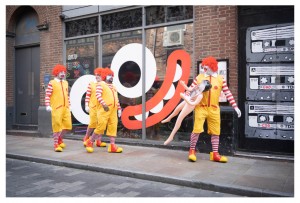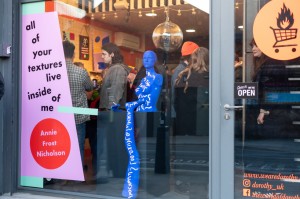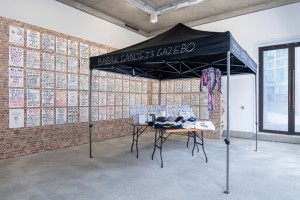The Big Interview: Bob and Roberta Smith
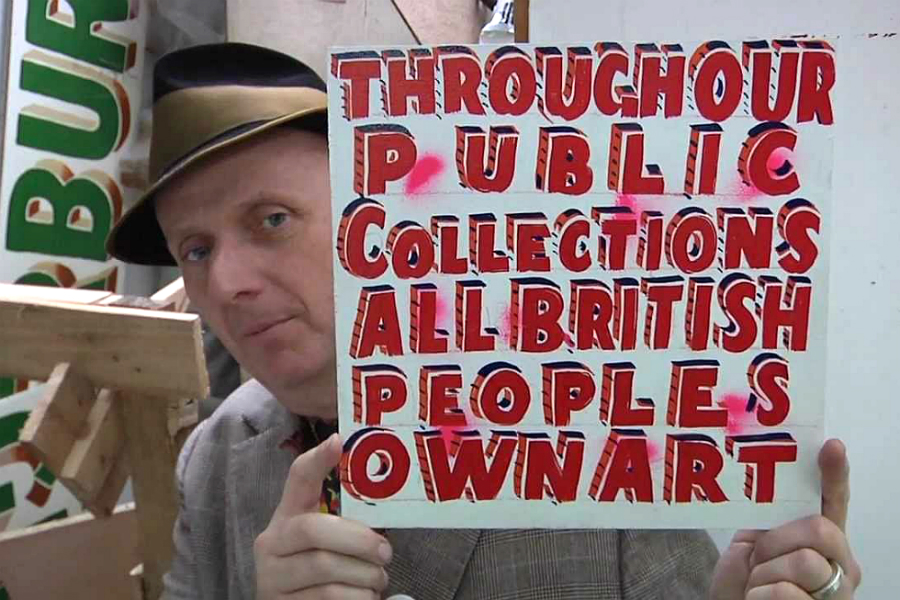
In their first ever interview together, Emma Sumner talks to the siblings behind Bob and Roberta Smith and the recent Art Party Conference…
Bob and Roberta Smith, or Patrick Brill, is an artist best known for his brightly coloured, tongue-in-cheek reflections on art, politics and popular culture, painted in a unique typography. These artworks are often connected to his slightly more serious campaigns, the latest of which is the Art Party Conference, an experimental platform for arts advocacy. Providing a forum for the artist’s voice to debate the future of the arts in today’s climate of spending cuts and education changes, the debut conference (23 November 2013) aimed to promote the importance of what artists do.
There are several theories about the Bob & Roberta Smith pseudonym. One explains that Brill devised several artist personas and then sent examples of his work to commercial galleries, the first to gain a positive response being Bob and Roberta Smith. I find out that Roberta is his sister’s name; another theory is that they created the name Bob and Roberta Smith whilst collaborating as artists; Patrick liked it and so the pseudonym stuck.
In a unique exclusive, I talked to both Patrick (or Bob) and his sister Roberta in their first ever interview together, during the hustle and bustle of the Art Party Conference, to find out more about their combined passion to keep arts education at the core of our national curriculum.
Why hold the first Art Party in Scarborough? Does it hold any relevance to political conferences being held in seaside towns?
Patrick: Yes absolutely, I think the Labour party had a conference here sometime at the end of the 1980s or early 1990s with Michael Foot. I’ve never been to a real political conference and it’s interesting to recreate that idea, as they must be really boring affairs, listening to politicians moan away all day, but this is really exciting.
Roberta: But they don’t come here for the conference, they come here for the fabulous night life after the conference. It’s all about the after-conference party, that’s when it all happens.
Patrick: Really! You’re talking about Alan Clark aren’t you? The infamous Alan Clark.
Roberta: Yes, that’s why they come to the seaside towns. It’s not for the serious political discussions, and it’s going to be like that here tonight isn’t it Bob…
Patrick: Well I wouldn’t want to promote that (laughs). But the reason for holding the conference in Scarborough was also that Tom Hudson, Victor Pasmore and Richard Hamilton started the art foundation course here which was an important moment in arts education. Our Dad (painter Frederick Brill who taught at Chelsea School of Art, 1965-1979) worked in art education and that was our introduction to it so it’s interesting to come to one of the quirkier and more bizarre roots of arts education. Also Scarborough is a beautiful place; I teach in London and a lot of my students have come here today and I want to show them what they are missing in London.
Roberta: You talked about our Dad there for a minute…
Patrick: And our Mum … probably watching afternoon plus on TV!
Roberta: If not them personally, it was their generation that fought for democracy, wasn’t it? I think there was something about being part of the baby-boom generation, who really benefitted from education, and the idea of freedom of speech and expression, and of course, what art expresses is between words and is so important to human life. This is what the Nazi’s didn’t want and this is what our parent’s generation fought for, so what are we doing, what’s going on? It’s not good!
Patrick: Yes, what are we doing marginalising all that; it’s not the right thing to be doing, is it.
Roberta: I think this is an important conference and I think it’s great it’s in Scarborough.
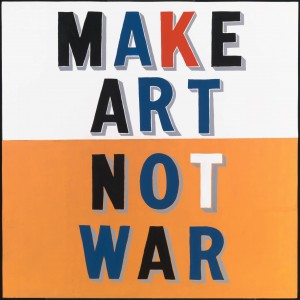
The conference follows on from your letter to Secretary of State for Education, Michael Gove, which we heard you read out at the beginning of the conference. In your letter, you define creativity as a rebellion: is this conference a demonstration of that rebellion?
Patrick: Well, I think creative people and invention doesn’t depend on following all the rules. It perhaps depends on understanding some of those rules, but it depends on questioning those rules. There is a link between art and rebellion, it’s a very strong link actually, between trying to say, ‘oh it should be like this’, and not how it is. It should be about a genuine kind of revolution, in a positive way, without murdering anybody. What do you think Roberta?
Roberta: Well, this is very important to me as I work in a prison, with people have murdered people and actually art is a way of expressing aggression without hurting anyone, and that is incredibly important; (turns to Bob) you did a wonderful painting called Make Art Not War didn’t you? People need to be able to express aggression without causing anyone else any pain or damage and art is a perfect way of doing that. The moment you get a sheet of white paper and you make a mark on it you have spoiled some kind of perfection, you have to use an aggressive part of yourself to do that and to make that mark. It’s really important that art is not marginalised, otherwise we would have more aggression acted out in society.
You criticised Gove’s tie and shirt combinations. Do you think if we arranged for him to have a makeover it might help him understand the importance of creativity?
Patrick: Yes, I do (laughs). I think he has already had a bit of a makeover. When I wrote that he used to look dreadful; a man in his mid-forties wearing glasses and making some terrible mistakes. They have obviously addressed this and tided him up a bit, but he used to wear terrible tie and shirt combinations, and you have to get things really wrong to get them to look right and he only sort of got them half-right.
Roberta: I do feel on this one that just right now I’m not one to criticise Michael Gove’s dress sense! (Everyone laughs. Roberta is wearing a fabulous 1920s-style flapper dress, with some of Patrick’s painted letters hanging on her person, topped off with a purple feather headband)
Patrick: I think Mrs Gove is looking after him a bit better than in the past. It’s quite funny as it has generated lots of visceral images of Michael Gove. But in truth, if I met Michael Gove, I would love to sit down and talk it through with him as I feel we need to engage with our politicians. I don’t want to demonise Michael Gove, and it’s all in good nature, lambasting his tie and shirt combination.
You describe this conference as the antidote to all other conferences, could you explain this?
Patrick: What this shows is that actually there is a lot of interest in really hard political issues, and that politicians don’t often get it right, and if you do get it right you can attract lots of people to come. If you try to cajole everyone into a party in the way UK politics is organised, that’s OK, but it buggers things up a bit. (At this point artist Haroon Mirza arrives ready for his evening performance and Patrick has to dash off to help him get set up. Roberta stays and continues the interview)
If Michael Gove’s plans where to go ahead and the arts did get marginalised in our education system, what do you expect could happen?
Roberta: I think it would be a drearier world, a more violent world. I don’t think it would be good for the nation or the nation’s identity or pride; it wouldn’t be good for tourism or balancing the books. I don’t think anyone wants that and I don’t think Michael Gove wants that either, so hopefully that’s all just a bit unthinkable. We need to keep this a creative and thinking country where we can explore things and express ourselves, look at the alternatives, make fun at ourselves and not be too serious. We need to be able to do all of this as it’s an important part of being a well-rounded country of creative human beings.
Do you have any advice for artists working in today’s climate of cuts?
Roberta: My only advice is to keep working and keep creating the stuff. The great thing about being creative is that although you do need support, in the end, you can make work in so many different media and it’s really important that you just keep doing this, regardless of what’s going on around you. Keep working and don’t give up.
Emmer Sumner
Bob and Roberta Smith’s letter to Michael Gove is available to read on his website
The Art Party Conference was held 23 November 2013



